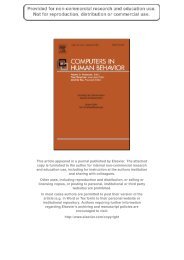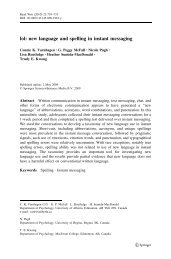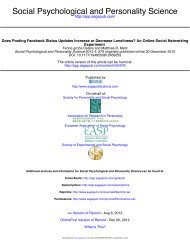Warschauer.pdf
You also want an ePaper? Increase the reach of your titles
YUMPU automatically turns print PDFs into web optimized ePapers that Google loves.
42 Learn Inq (2007) 1:41–49<br />
millennium. In the centuries after the Gutenberg revolution, the notion of reading<br />
changed from oral performance to silent comprehension; the notion of writing<br />
changed from copying manuscripts to original creation; and the notion of scholarship<br />
changed from mastery of a few religious texts to examination of a wide field of<br />
knowledge (Eisenstein, 1979).<br />
There is reason to believe that digital technologies will in the long run have as<br />
much impact on learning and literacy as the printing press had (see, for example,<br />
discussion in Harnad, 1991), and, indeed, this transformation is already under way<br />
(see Leu, Lankshear, Knobel, & Coiro, in press). However, technology does not<br />
transform learning and literacy by itself, but only in conjunction with other social<br />
and economic factors. For example, the earlier changes in learning and literacy<br />
mentioned above occurred over several centuries and resulted not only from the<br />
invention of the printing press but also from the Protestant Reformation and the<br />
industrial revolution (Eisenstein, 1979).<br />
With a broad post-industrial social and economic transformation well under way<br />
(see Castells, 1996), at least in the US and other industrialized countries, the transition<br />
to digital literacy may well occur faster than the earlier transition to print<br />
literacy. But it will not be instantaneous. We thus find ourselves in a transition<br />
between what Bolter (1991) called the late age of print and others (e.g., Attewell &<br />
Winston, 2003) have called a post-typographic society.<br />
This transitional stage suggests that the future of learning in the 21st century will be<br />
quite complex, as we strive toward post-industrial forms of knowledge acquisition and<br />
production without having yet overcome the educational contradictions and failings of<br />
the industrial age. In the remainder of this essay, I examine the paradoxes that emerge<br />
when we examine three widely accepted beliefs about the future of digital learning,<br />
related to what people learn, how they learn, and where they learn in the digital era.<br />
The what paradox: new versus traditional literacies<br />
The first paradox relates to what students need to learn in the new digital classroom.<br />
A wide range of organizations (e.g., North Central Regional Educational Laboratory<br />
& the Metiri Group, 2003; Partnership for 21st Century Skills, 2004) and individuals<br />
(e.g., Gee, 2003, 2004; Lemke, 1998) have argued that the literacies of the print era<br />
are being superceded by a new set of digital-age literacies, the most frequently<br />
mentioned of which are information literacy and multimedia literacy.<br />
Information literacy refers to the ability to define what sorts of information are<br />
needed; locate the needed information efficiently; evaluate information and its<br />
sources critically; incorporate selected information into one’s knowledge base;<br />
understand the economic, legal, and social issues surrounding the use of information;<br />
and access and use information ethically and legally (American Library Association,<br />
2000). Though the need for information literacy pre-dates the digital era, its<br />
importance has now greatly expanded in a world where vast amounts of unfiltered<br />
data are available online. The ability to draw on draw rote answers is inadequate in a<br />
world where yesterday’s answers are outdated faster than ever. Education must<br />
equip students to aim further ahead of a faster target.<br />
Castells’ (1996) in-depth analysis of the US and world political economy underscores<br />
the crucial value of information literacy in today’s world. As his landmark<br />
123
















